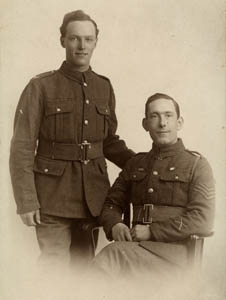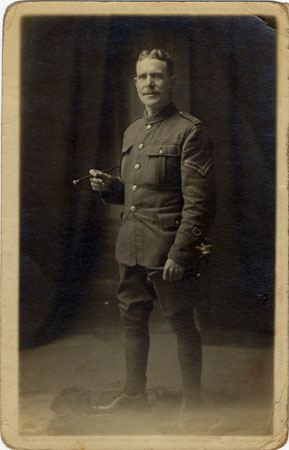Armistice Letters
The eleventh hour of the eleventh day of the eleventh month, 1918. Armistice Day, the day when the guns fell silent on the Western Front, is one of the most poignant dates in the British calendar. During the First World War the British Empire lost approximately 900,000 men, with more than two million wounded. The scale of these losses means that Armistice Day is remembered today by many countries as a symbol of the suffering caused by wars of every era.
It is sometimes forgotten that Armistice Day did not stop the deaths caused by the war. More than 5,000 British troops died after 11th November – of wounds, disease, and in accidents – and in action in Russia where the war still continued into 1919. While the population of the world, both military and civilian, started to adjust to the prospect of peace another terrible blow struck when a great flu epidemic swept through much of the world carrying off millions.
Now, ninety years on, Armistice Day 1918 is rapidly passing out of living memory. But the stories of those who lived during those times live on in the archives – in letters, diaries, newspapers and photographs.

Charles Cyril Verdcourt of Luton (1897-1985), pictured left with an unknown friend, served in the 3rd Battalion, Bedfordshire Regiment, and was in training at Felixstowe when the Armistice was announced. He wrote to his mother Helena on 12 November 1918 [Ref: Z549/17/66]:
‘Dear Mama,
Can you believe that the war is over? It seems impossible to me to realise it, and yet unless by the remotest chance there is trouble with a section of the German navy, or disagreement over the ‘peace table’, there will be no further fighting. When peace is really signed, I suppose that, save for secret heart bleeding and agonising memories of lost ones, the world – war will pass away ‘a seven days wonder’, and although the effects, which in most instances will I hope improve conditions of life, will never pass away, yet the world will settle down to the routine of life as it did to the routine of war.
This morning, our C.O., Lord Ampthill, paraded the battalion and addressed us with a speech concerning the armistice, telling us that training would not be reduced until peace had been signed, or orders came through from Government. Yes, mama dear, I enjoyed the rabbit, for I get very hungry and the ‘wads’ or buns that the canteens sell do not satisfy one’s hunger.
The gloves, I received yesterday but in the excitement I forgot to mention them. They fit splendidly and were very useful today, for the weather has been cold. Please thank Louis [brother] or better still, I will write to-night to him and thank him. The name John Childs conveys no meaning to me.
Cinemas etc. are still open here, but at Bedford I hear that the flu’ has wrought fearful havoc and every place of amusement is closed to the military.
I do not remember receiving [sister] Maud’s letter, but I thank her for writing.
My papers were supposed to be for duration, but nobody can give a forecaste [sic] as to demobilisation. I would not take much notice even of Papa, concerning that, although his predictions have an uncanny knack of coming to pass.
Well goodbye, Mama dear, and give my love to all.
I am yours truly, Cyril ’

By contrast, Hector Newman of Woburn Sands (1879-1944) [right] served with the Oxfordshire and Buckinghamshire Light Infantry and was wounded in France in 1916. By November 1918 he was post corporal at Vicarage Camp, Seaton Delaval, Northumberland. He wrote to his sister Kitty on 14 November 1918 [Ref: Z251/445]:
‘They did let themselves go on Monday here, a day’s holiday, But my mate & myself worked as usual. The PRI (President Regt Institute) went to the canteens at both camps & bought up all the beer (that is Major Starling) & it was all to be drunk same day & free to all & it averaged 1 gallon per man. When I went over to the Cpls’ [Corporals] Mess at dinner-time there was beer in buckets, bowls, huge jugs, piano going, dancing & as soon as you stepped in a bucket of beer was put in front of you & you had to drink out of it or have it thrown over you. It was a good day & everything went off alright. The officers were as lively as the privates & had a huge bonfire, & on which they burnt 2 Barrels of oil, & in consequence we have all been without oil for lamps & we went without yesterday for either the stove or lamp. So we bought a couple of candles but by Gad it was cold & no mistake, one of the old black frosts.
I think that we shall come off pretty well when we are demobilised. I’ll bet when the time comes, some of them who failed to join up will be sorry that they didn’t do so. You mark my words. I am truly glad I did & no mistake.
Oh! What a Happy Christmas this will be, never will carols be sung so vigorously. But, oh how sad for those whose loved ones will never return, the maimed, the halt & the blind, a grand sight, but yet so sad. Those are the men who deserve & should receive all that the country can do for them. I cannot dwell longer over it, for it makes me feel sad, for I have seen some of it & can fully realise what it all means. I have thanked God many times for bringing me safely through.’
These two perceptive letters mourn the losses incurred in the First World War and hope for better things to come. Ironically, the Versailles Treaty of 1919 led to an uneasy peace that was shattered in less than a generation.